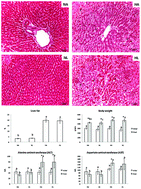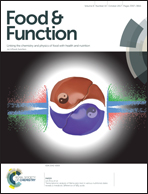A study of the prebiotic-like effects of tomato juice consumption in rats with diet-induced non-alcoholic fatty liver disease (NAFLD)
Abstract
Gut microbiota may play a role in the pathogenesis of NAFLD. We investigated whether tomato juice consumption for 5 weeks could ameliorate high-fat diet-induced alterations in certain intestinal bacterial groups and products arising from their metabolism (short-chain fatty acids and microbial phenolic catabolites). For this, we used a rat model with NAFLD induced by a high-fat diet, involving four experimental groups: NA (standard diet and water), NL (standard diet and tomato juice), HA (high-fat diet and water) and HL (high-fat diet and tomato juice). The onset of NAFLD impacted the gut microbiota profile, reducing the abundance of Bifidobacterium and Lactobacillus and increasing that of Enterobacteriaceae. Also, reduced concentrations of propionate, butyrate and phenolic catabolites and an increased acetate to propionate (Ac : Pr) ratio were observed. Tomato juice intake partially ameliorated high-fat diet-induced disturbances, particularly by increasing Lactobacillus abundance and diminishing the Ac : Pr ratio, suggesting a potential improvement of the metabolic pattern of NAFLD.



 Please wait while we load your content...
Please wait while we load your content...